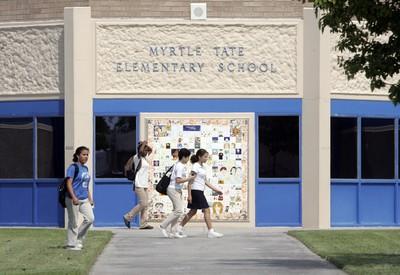Rulffes hails gains posted by schools
The Clark County School District is doing a better job of meeting federal education benchmarks, but a handful of its schools are doing worse than ever.
For the second consecutive year, the district in the 2006-07 school year increased the number of schools that met federal No Child Left Behind Act standards, according to results released Thursday.
However, four schools are in jeopardy of state takeover and staff shake-ups for failing to meet federal targets for too many consecutive years.
School system officials were jubilant at a news conference Thursday, announcing for the first time since inception of the law five years ago that the district as a whole met all federal guidelines.
"I hope to never hear that CCSD is a failing school district," Superintendent Walt Rulffes said. "We fully intend to go from one of the biggest school districts in the country, to one of the biggest and best school districts in the country."
The district improved the number of schools that met federal guidelines to 216 schools, up from 183 during the 2005-06 school year. The number of failing schools also dropped, to 123 from 149 during the 2005-06 school year.
The school system met all federal standards because enough of its students met benchmarks in English and math. The standardized test results of about 165,000 students were used to determine the district's performance.
Of the students tested in grades three through eight, at least 40 percent passed federal benchmarks in English and at least 43 percent passed benchmarks in math.
The standards for high school students were higher and only juniors were assessed. At least 52 percent of high school juniors had to meet federal requirements in math, while at least 78 percent had to meet requirements in English.
The federal standards in those subjects will increase to 100 percent by the 2013-14 school year, when the law dictates that all public school students must perform at their grade level.
FAILING SCHOOLS
Despite the improved performance, four district schools have failed federal guidelines six consecutive years, dating back to the year prior to the inception of the law. Under federal guidelines, principals at Tate Elementary School and Bridger, West and Von Tobel middle schools can be removed from their posts. Federal law also calls for the possible takeover of those schools by the Nevada Department of Education.
But Deputy State Superintendent Gloria Dopf said state takeover is unlikely.
"I would expect to look at other options," Dopf said. "We are not necessarily positioned to do that. Even if there was some form of takeover, I am not expecting it would be the Department of Education that would go in and run schools."
Dopf said it's more likely state officials would assist schools in implementing a restructuring plan.
Schools that have failed to meet federal standards for five consecutive years must develop a reorganization plan to improve the school's performance. The district had 28 schools that fell under that category.
During the five years the district had to monitor its performance based on federal standards, its achievement has gone down and up like a yo-yo. During the first three years under the law, the district performed poorly. As recently as the 2004-05 school year, more than two-thirds of the district's schools failed to meet federal guidelines.
Rulffes attributed the district's turnaround to educational programs launched years ago that are starting to show results. He said the federal No Child Left Behind law has made the district keenly aware of populations of students that were sometimes forgotten, specifically, special education students and students whose primary language is not English.
"It's been a good concept in addressing all of the populations in our schools," Rulffes said.
He added that the district must proceed with caution because the requirements for passing scores for all students in English and math will increase for the 2007-08 school year.
"We're going to make the hill steeper next year, but I think our students are up for the challenge," he said.
Passing scores did increase this past school year in math for high school juniors.
The federal law determines a school's performance based on the showing of students from 37 subgroups. Subgroups can be defined by race, special education needs, primary language and income level. If one subgroup at a school fails, the school fails.
School Board member Terri Janison said the intent of the federal law is good, but its stringent standards must be altered; there are schools that have improved but still failed under the law.
"Philosophically, it's a good law," Janison said. "But only one or a few students can fail, and then the school is penalized with that label. That's not fair."
The federal law is up for reauthorization this year, but proposals to tweak it probably won't be tackled by Congress until 2008, Dopf said.
"BEST KEPT SECRET"
District officials also announced Thursday that more schools met the two highest designations of performance: exemplary and high achieving. The number of exemplary schools increased to 11 from six during the 2005-06 school year. The number of high-achieving schools increased to 43 from 34.
Schools can receive those ratings by passing federal benchmarks for two consecutive years or more. To be named exemplary, a school also must reach high thresholds in its subgroups and overall school performance. To be named high achieving, the second-highest ranking, a school must do one or the other.
Squires Elementary School was among the 43 schools labeled high achieving. The North Las Vegas school, near Lake Mead Boulevard and Bruce Street, has some of the most challenging student demographics in the district. The school has more than 800 students, 93 percent of whom are Hispanic. All of its students come from low-income families, and more than 60 percent of them are enrolled in the program for students whose primary language isn't English.
Rose Ballard, the school's assistant principal, said her staff is dedicated to improving student achievement regardless of the financial and social circumstances at her school.
"It's all about expectations," Ballard said. "Kids will live up to what you believe they can do."
Ballard credited the dedication of her staff, and a few programs at her school, for the achievement of her students. The school conducts a two-hour after-school program in which nearly half of its students participate. The first hour of the program is dedicated to improving reading. The second hour is dedicated to club activities such as dancing or arts and crafts. The program is paid for by a federal grant of about $50,000 a year, money that is mostly used to pay teachers for their extra work, she said.
Ballard also credited a program called cooperative learning. Students are placed in groups of four consisting of one high- and one low-performing student, and two students deemed average performers.
Students in the groups work together to solve problems and learn from each other, she said.
Kate Cameron, a second-grade teacher at Squires, called her school "the best kept secret in Las Vegas." Cameron said all the school's teachers work well together. Teachers brainstorm for about 45 minutes a day about their lesson plans.
"We've helped these students be the best they can be," she said. "But none of us could do it alone."
Tate Elementary School, about three miles northeast of Squires, is on the opposite end of the achievement scale. Tate was one of the four schools in the district that has failed federal standards six consecutive years.
Parents waiting to pick up their children at the school Thursday were surprised by the school's federal designation.
Carmen Toscano shouted in disbelief when she heard her daughter's school has yet to meet federal standards.
"I'm glad this is her last year at this school," she said of her fifth-grade daughter.
Parent Jeff Dowd said he had mixed feelings about Tate's federal designation. He said he didn't know much about No Child Left Behind, but his fourth-grade daughter was doing well at the school, earning A's and B's.
After thinking about the issue longer, he noted that his three other children who have passed through the school didn't perform as well as his daughter who attends the school now.
"I've seen plenty of instances where they've let kids just slide on by," Dowd said.
HOW CLARK COUNTY SCHOOLS MEASURE UP A school-by-school breakdown of benchmarks (PDF)



















